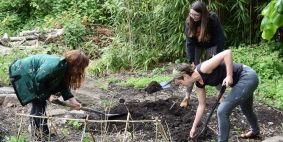Undergraduate courses
You will delve into deep questions and learn how to rigorously analyse concepts and arguments across a whole range of topics.
Philosophy can cover a whole range of topics. Questions you will investigate may include:
- What sort of things exist?
- Are we free to choose our actions?
- Is a person their mind or their body?
- How can we acquire knowledge of an external world?
- What determines whether an act is right or wrong?
- Do non-human animals have rights?
- How do words come to have meanings?
- What are our obligations to future people?
You will be taught how to conduct rigorous analysis of key concepts, carefully investigate why these concepts are important, critically examine arguments for different views, and develop your own coherent and persuasive views and arguments.
You will develop a thorough understanding of Philosophy as it is practised in the analytic tradition and can explore your interests through specialised units and independent research, from political philosophy to the philosophy of physics.
In addition to the BA in Philosophy, there are many joint honours programmes to choose from. We also offer an innovative, one-year degree course is for any student currently studying medicine, dentistry or veterinary science at the University of Bristol or elsewhere: Intercalated BA Medical Humanities. The department also contributes to the multidisciplinary liberal arts courses: BA Liberal Arts, MLibArts Liberal Arts with Study Abroad.
Further information on studying Philosophy at the University of Bristol
The culture of Bristol's philosophy department is what I love, the teaching staff have a clear passion for their work and this is clear in their teaching as well as the things they do to go above and beyond to support you. It's a privilege to be a part of such a welcoming environment
Bristol offers such a wide variety of module choices that it feels like I’m studying several subjects I’m interested in.
The philosophy society is a great place to meet course-mates in the same year or in other years too. It is an opportunity to speak to current students about modules they've taken and what can be expected from them but also a place to discuss and debate new philosophical stances and hear from peers about their thoughts on the matter.
Studying Philosophy leaves me with wide-ranging career options, so whatever I choose to do I know I'll have a strong grounding in being able to academically evaluate, unpick arguments and think more widely about issues.
What can I do with a philosophy degree?
A wide range of employers value the analytical skills you will be taught studying philosophy, such as flexibility of thought and the capacity for developing coherent and compelling arguments.
Recent philosophy graduates have gone on to work as lawyers, journalists, teachers, consultants, software developers, and leaders in business. Find out more.
 Applying to Bristol
Applying to Bristol
 Did you know?
Did you know?
The department has its own allotment, known as the 'Kierkegaarden'.
It's maintained by students and academics, encouraging discussion around ethics of the environment as well as providing some delicious food.
My time at Bristol allowed me to discover a wide range of topics in Philosophy, allowing for a broad understanding of the subject. My lecturers have been engaged, enthusiastic and always willing to help out when I’ve struggled with any aspect of the course.